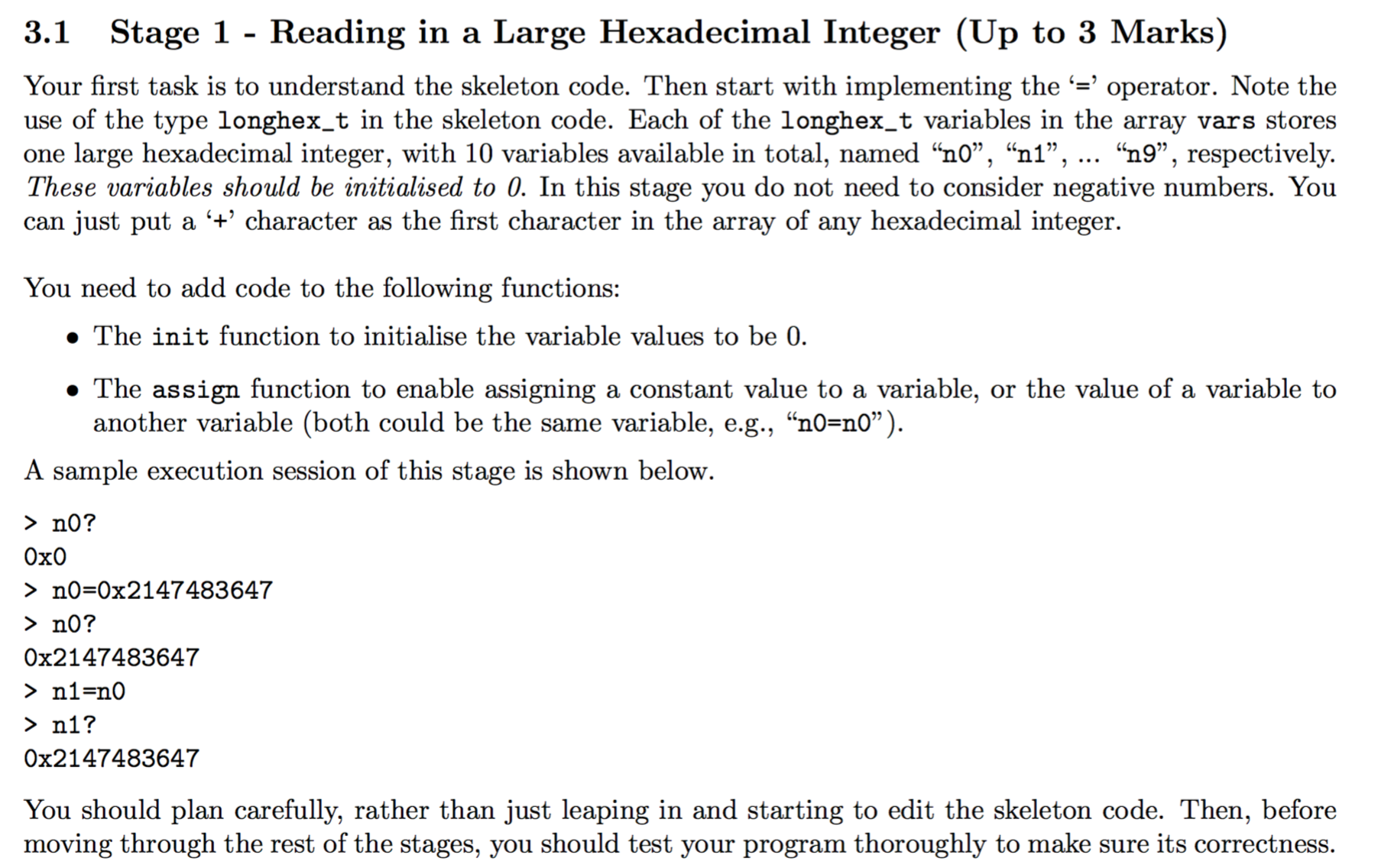Answered step by step
Verified Expert Solution
Question
1 Approved Answer
YOU NEED TO Use C program to create a hexadecimal calculator to do the equality and addition The Code you need to add things to
YOU NEED TO Use C program to create a hexadecimal calculator to do the equality and addition

The Code you need to add things to run!!! #include
#include #include #include #define INT_SIZE 101 /* max number of digits (and sign) per integer value */ #define LINE_LEN 106 /* maximum length of any input line */ #define NUM_VARS 10 /* number of different variables */ #define BASE_HEX 16 /* base of hexadecimal system */ #define CH_ZERO '0' /* character 0 */ #define POS_SGN '+' /* sign for positive number */ #define NEG_SGN '-' /* sign for negative number */ #define ASN_OP '=' /* addition operator */ #define ECH_OP '?' /* addition operator */ #define ADD_OP '+' /* addition operator */ #define SUB_OP '-' /* addition operator */ #define MUL_OP '*' /* addition operator */ #define EXIT_CMD "exit" /* command to exit */ #define PROMPT "> " /* command prompt */ #define HEXA "0x" /* hexadecimal prefix */ #define CMT_FLAG '%' /* indicator for comment line */ /* add your own defined constants here */ typedef char longhex_t[INT_SIZE]; /* one large hexadecimal "variable" */ /****************************************************************/ /* function prototypes */ void read_line(char *line, int max_len); void init(longhex_t vars[], int lens[]); void echo(longhex_t var, int len); void assign(longhex_t vars[], int lens[], int index, char *parameter); void add(longhex_t vars[], int lens[], int index, char *parameter); void subtract(longhex_t vars[], int lens[], int index, char *parameter); void multiply(longhex_t vars[], int lens[], int index, char *parameter); /* add your own function prototypes here */ /****************************************************************/ /* main program controls all the action */ int main(int argc, char *argv[]) { /* DO NOT CHANGE THE MAIN FUNCTION */ char line[LINE_LEN+1]; /* to hold the input line */ longhex_t vars[NUM_VARS]; /* to hold 10 large hexadecimal integers */ int lens[NUM_VARS]; /* to hold the length of the 10 vars */ int index; /* index of the first variable in command */ char op; /* operator in command */ init(vars, lens); while (1) { printf(PROMPT); /* print prompt */ read_line(line, LINE_LEN); /* read one line of command */ if (line[0] == CMT_FLAG) { /* print comment in the test data */ printf("%s ", line); /* used to simplify marking */ continue; } if (strcmp(line, EXIT_CMD) == 0) { /* see if command is "exit" */ return 0; } index = line[1] - CH_ZERO; /* first var number at line[1] */ op = line[2]; /* operator at line[2] */ if (op == ECH_OP) { /* print out the variable */ echo(vars[index], lens[index]); continue; } /* do the calculation, second operand starts at line[3] */ if (op == ASN_OP) { assign(vars, lens, index, line+3); } else if (op == ADD_OP) { add(vars, lens, index, line+3); } } /* all done; take some rest */ return 0; } /* read a line of input into the array passed as argument; * no need to change this function. */ void read_line(char *line, int max_len) { int i = 0, c; while (((c = getchar()) != EOF) && (c != ' ') && (c != ' ')) { if (i 0; i--) { putchar(var[i]); } printf(" "); } /****************************************************************/ /* set the vars array to all zero values */ void init(longhex_t vars[], int lens[]) { /* add your code here */ } /* process the '=' operator */ void assign(longhex_t vars[], int lens[], int index, char *parameter) { /* add your code here */ } /* process the '+' operator */ void add(longhex_t vars[], int lens[], int index, char *parameter) { /* add your code here */ }
Step by Step Solution
There are 3 Steps involved in it
Step: 1

Get Instant Access to Expert-Tailored Solutions
See step-by-step solutions with expert insights and AI powered tools for academic success
Step: 2

Step: 3

Ace Your Homework with AI
Get the answers you need in no time with our AI-driven, step-by-step assistance
Get Started


